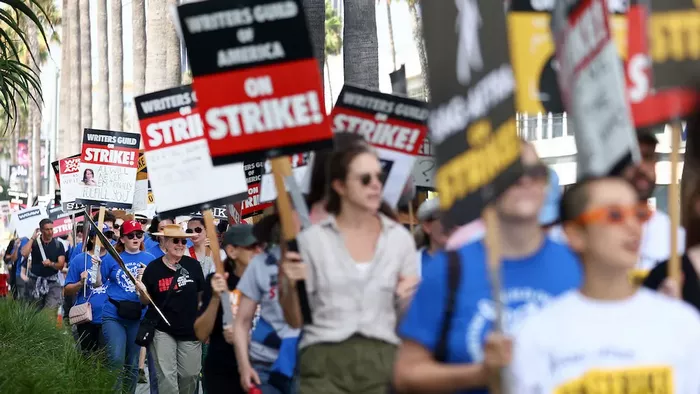In a much-awaited and significant development in the entertainment industry, the Hollywood writers strike, which had stretched on for 148 long days, is finally coming to an end. The Writers Guild of America (WGA) and the Alliance of Motion Picture and Television Producers (AMPTP) have successfully reached a tentative agreement, marking the conclusion of the second-longest strike in Hollywood’s history.
A Lengthy Struggle Nears Its End
The Hollywood writers strike, which began on May 2, had cast a shadow of uncertainty over the entertainment world. Writers, who play an essential role in shaping the stories that captivate audiences worldwide, had taken to the picket lines to demand fair compensation and better working conditions. The strike had disrupted the production of numerous television shows and films, leaving both viewers and industry professionals in a state of limbo.
Throughout the 148 days, negotiations between the WGA and AMPTP had been ongoing, with both parties striving to find common ground and reach an agreement that would put an end to the strike. The prolonged duration of the strike had underscored the significance of the issues at hand and the determination of the writers to secure a favorable deal.
A Tentative Deal Sealed with Approval
The breakthrough in ending the writers strike came with the announcement of a tentative agreement between the WGA and AMPTP. This accord was reached after extensive negotiations and discussions, involving input from all parties concerned.
The tentative deal received unanimous approval from the negotiating committee of the WGA, as well as from the boards of the Writers Guild of America West (WGAW) and the Writers Guild of America East (WGAE). This overwhelming support underscored the consensus among writers and their belief that the agreement addressed their key concerns.
Strike Officially Ends
The official end date for the writers strike has been set for September 27 at 12:01 a.m. PT. This marks a crucial moment for the entertainment industry as it can finally start to recover from the disruptions caused by the strike. Productions that were put on hold or delayed due to the strike can now resume, bringing relief to studios, networks, and audiences eager for fresh content.
The conclusion of the strike also provides a sense of closure and relief for the writers themselves. Their determination and solidarity throughout the 148 days have showcased the importance of fair compensation and better working conditions for writers in an industry that relies on their creativity and talent.
Impact and Implications
The end of the writers strike has far-reaching implications for the entertainment industry. It not only paves the way for the resumption of stalled productions but also serves as a reminder of the power of collective bargaining in ensuring the rights and well-being of industry professionals.
The tentative agreement reached between the WGA and AMPTP signifies a compromise that addresses the concerns of writers while also allowing the industry to move forward. It is a testament to the importance of fair labor practices and negotiations in a field that thrives on creativity and storytelling.
Looking Ahead
As the writers strike officially comes to an end, Hollywood can now look ahead to a future where writers are fairly compensated for their work, and productions can resume their creative journeys. It serves as a reminder of the resilience and unity of the entertainment industry, which has weathered its fair share of challenges over the years.
While the strike was marked by tension and uncertainty, it also highlighted the shared commitment of writers, studios, and the broader entertainment community to creating content that captivates and inspires audiences worldwide. As the strike draws to a close, the focus can now shift back to what the industry does best—telling stories that entertain, inform, and connect with people around the globe.

